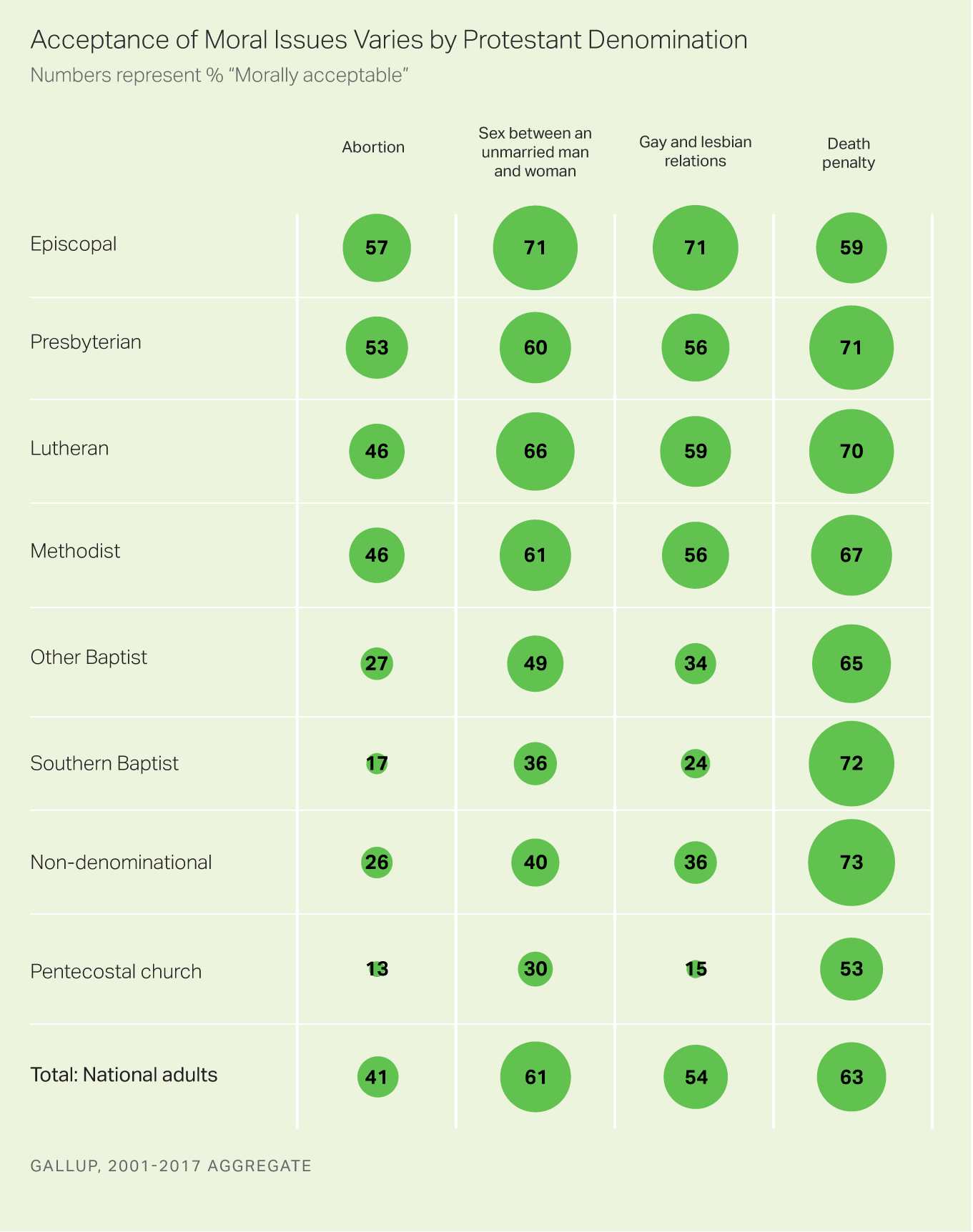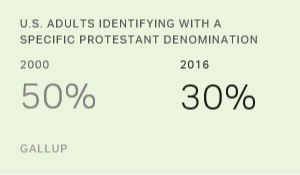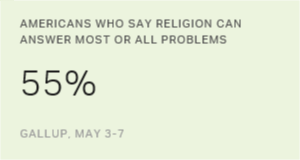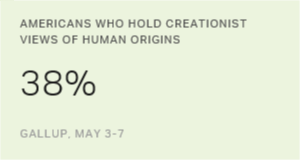Story Highlights
- Mainline Protestants more accepting of gay relations and abortion
- Episcopalians are particularly more liberal than others regarding gay relations
- Pentecostals tend to be the most conservative on all issues measured
WASHINGTON, D.C. -- U.S. Protestants' views on moral issues such as abortion, gay and lesbian relations, and premarital sex differ sharply, depending on their denominational affiliation. Episcopalians, Presbyterians, Methodists and Lutherans -- the "mainline" denominations -- are distinctly more liberal on a number of moral issues than are Baptists, Pentecostals and those identifying with nondenominational Protestant groups.

These findings are based on an analysis of aggregated data from Gallup's annual Values and Beliefs surveys, conducted each May since 2001. The 2001-2017 aggregate provides large enough samples for individual analysis of the major Protestant denominations. The Values and Beliefs surveys include a wide variety of questions about moral issues; those included in the analysis here are the ones most prominently involved in recent public discussion.
The differences across Protestant denominations on three of the four issues reviewed for this analysis are substantial.
Mainline Protestants -- who make up about 11% of the U.S. adult population -- are significantly more accepting of abortion, premarital sexual relations, and gay and lesbian relations than the other groups. For example, between 60% and 71% of the mainline Protestant groups say premarital sex is morally acceptable, while less than half in the other denominations agree. No less than 56% of those in mainline denominations say gay or lesbian relations are OK, but no more than 36% of those in other denominations share that view.
Views on the death penalty show greater similarity across denominations, with Baptists and nondenominational Protestants joining mainline Protestants in strong majority acceptance of the practice. Pentecostals stand alone with a significantly lower acceptance of the death penalty than any other denominational group.

Gallup Analytics
Subscribe to our online platform and access nearly a century of primary data.
As with U.S. adults more generally, mainline Protestants are less likely to find abortion morally acceptable than premarital sex or gay/lesbian relations. But mainline Protestants are still roughly twice as likely as other Protestants to say abortion is morally acceptable.
Although those who identify with one of the mainline denominations hold more liberal positions than those who identify with the other denominations in this analysis, Episcopalians are somewhat more liberal on the issue of gay and lesbian relations than are Presbyterians, Methodists and Lutherans. Differences among these four mainline groups are less significant on other issues.
Protestants who identify as Southern Baptists -- about 3% of the overall population during the years when these data were collected -- tend to be slightly more conservative on these issues than the 9% of American adults who identify as Baptists, but not Southern Baptists. Pentecostals are the most conservative of these eight denominational groups: 13% of Pentecostals say abortion is morally acceptable, 15% say gay/lesbian relations are OK, and 30% say the same about premarital sex.
Because of the large time span involved in this aggregation, the absolute percentages of those who find behaviors acceptable are not necessarily the same as where the attitudes stand today. For example, Americans as a whole, and Protestants as a group, have become more accepting of gay and lesbian relations and of sex outside of marriage since 2001. The aggregated figures in this analysis are useful in terms of identifying differences across the denominations -- differences that have generally held steady over time, even as acceptance on certain issues has shifted.
Implications
Protestants regardless of denomination are often combined into a single group for survey analysis purposes. For example, the 2016 presidential election exit polls divided voters broadly into Protestants and Catholics. But the current analysis documents major differences within the broad group of Protestants on a set of important policy issues relating to moral values, underscoring the need for caution among those attempting to characterize Americans by their religion.
The broad swath of the population identifying as Protestant contains disparate groups of denominations with substantially different views on specific issues. There are a number of reasons for these distinctions, based on the historical traditions of the denominations, the ways in which they interpret and teach the Bible, and -- importantly -- the types of people who identify with each. Episcopalians, for example, have one of the highest levels of educational attainment of any religious group, do not assume the Bible is literally true, and generally tend to identify as more socially liberal than other Protestant groups. Southern Baptists, by contrast, have lower educational attainment on average, are more likely to be biblical literalists, tend to be socially conservative and live in more conservative areas of the country.
Understanding Protestants remains an important research objective because they constitute the largest category of religious identification in the U.S. today, about twice the size of those identifying as Catholics, the second-largest religious group. And more broadly, religion continues to be an important component of understanding the nation's contemporary political scene.
Survey Methods
Results for this Gallup poll are based on telephone interviews conducted as part of Gallup's annual Values and Beliefs surveys each May between 2001 and 2017. Most of these surveys were conducted with random samples of approximately 1,000 national adults, aged 18 and older, living in all 50 U.S. states and the District of Columbia. For results based on the total sample of 17,765 national adults in the aggregated sample, the margin of sampling error is ±2 percentage points at the 95% confidence level. The results based on the aggregated samples of denominational groups vary in sample size from 222 to 1,450, with margins of sampling error between ±3 and ±8 percentage points at the 95% confidence level. All reported margins of sampling error include computed design effects for weighting.
Protestants are those who indicated they were Protestant in response to an initial religious identification question or in response to a follow-up probe asked of those who did not initially classify themselves with a religious identity. Each respondent who identified as Protestant was asked to indicate their specific denomination.
Learn more about how the Gallup Poll Social Series works.



